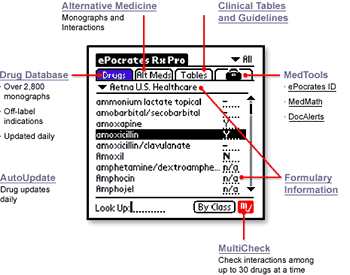 |
|
|
I have been working with the ePocrates Rx Pro ($49.99) version of ePocrates for over a month now, and here are my observations.
Now for the extras and changes, and there are quite a few. To begin with, ePocrates' own information update service (called DocAlerts) are now integrated into ePocrates. (This is also the same in the free version, but I jumped from the previous free version, straight to 6.0 Pro). Every time you sync, in addition to the usual medication and formulary updates, ePocrates also sends out notes on everything from new black-box warnings and dosing changes, to the ubiquitous product update alerts. Some of these are set so that you can request further info by email, while others can be saved as memo-like files in an applet that looks and feels almost identical to Palm's own memopad. This can be useful for keeping the newest vaccination schedules with you (or whatever they send that you elect to keep.) New for the ePocrates Rx Pro version is a tab that opens a list of alternative meds (everything from herbs and mushrooms to vitamins and nutritional supplements.) This one is really cool. How many times have you have had a patient tell you s/he is taking something like daidzein (it's red clover, and people take it for everything from asthma to STDs) or zhi tai (red yeast - used to lower cholesterol), and you just smiled and wrote it down. Now you can look it up. ePocrates has a section on common uses, doses, adverse reactions, drug interactions, synonyms (I'm not taking Ephedra, I'm taking Ma Huang!), and (when known) a list of cautions and even mechanism of action. Did you know, for instance, zhi tai (red yeast) actually contains the drug lovastatin (Mevacor)? So yes, it might actually lower your cholesterol, but if you are taking a drug that interacts with lovastatin, (like diltiazem) it might not be a good idea. This leads me to the next cool thing...MultiCheck. ePocrates Rx Pro has had a subprogram that allows you to check your patient's medications for interactions. The MultiCheck in ePocrates Rx Pro also looks at its alternative meds list. This is really neat. Here is another example - there was a big craze for the herbal remedy St. Johns Wort (Hypericum perforatum) a few years ago. It is a major seller in Europe as an antidepressant, and there are papers published that purportedly back up claims that it works almost as well as Prozac (I don't know, I haven't read them). In my practice as an NP, I have come across several patients with chronic illnesses taking St. Johns Wort, and I can't say I blame them, I'd be depressed too. However, if you come across a patient with HIV, who is on the triple cocktail of antiretrovirals, it might be wise to caution them against taking St. Johns Wort. It turns out it interacts badly with several of the protease inhibitors, making them much less effective. (This is the big problem with alternative meds - people don't think of them as drugs. "Its all natural, so it has to be safe!" - when you hear things like that point out that ricin (the poison that was used to kill Bulgarian diplomat Georgi Markov in London in 1978) comes from castor bean seeds, and that Digitoxin is a derivative of foxgloves (Digitalis purpurea). Both are "all natural plant extracts" that will kill you if you take too much ) --- But I digress. On with the review. Also not new to ePocrates, is ePocrates ID, the infectious disease program. Previously, ePocrates ID was available as a separate (pay) program. Now it is included with the ePocrates Rx Pro. This one may be less interesting to the average staff nurse, but it may come in handy for impressing the docs or residents. I carried a Sanford's guide as an ICU nurse, because my residents really appreciated it when I could call them and say something like "your patient has X growing in his sputum. Sanford's says to use cephalowonderful, 1gram Q8 hours. Can I have an order?" ePpocrates ID is faster to use and the print is bigger, plus its updated more than once a year. You can look up an infection by location, bug or drug, and follow down through several levels to get to recommended antibiotic regimens. When you get to the drug names, you can tap on a drug and be taken straight to that drugs's ePocrates entry, so you can look up the dosing etc. This is one of my few complaints about the whole setup - I could not find a link straight to ePocrates Rx from ID, without going all the way down to the drug regimens. If I didn't like the drug, I had to tap my way back to where I was in ID. The last cool thing included is MedMath, which is a separate app,
but is included in the package. Some of the calculators may be a
little esoteric for the average staff nurse, (number needed to treat?
Basal energy expenditure?, Creatinine clearance?), but others are
bang on. There is a drip calculator that lets you store the drugs
you use in the standard concentrations that your facility uses,
a pregnancy wheel replacement, units converters for metric and US
measures and even and apgar score calculator (although if you need
a calculator for that one, maybe you shouldn't be working L&D).
If you are the morbid type, you can use the Ranson's score calculator
to figure out the chance that your pancreatitis patient has of dying
(here's a hint: if its seven or more of the eleven, he's going to
die.) Most of the patient-related calculators allow you to save
entries so that you can come back to them (or switch between patients).
Keith can be reached via email
|
|||||||||

